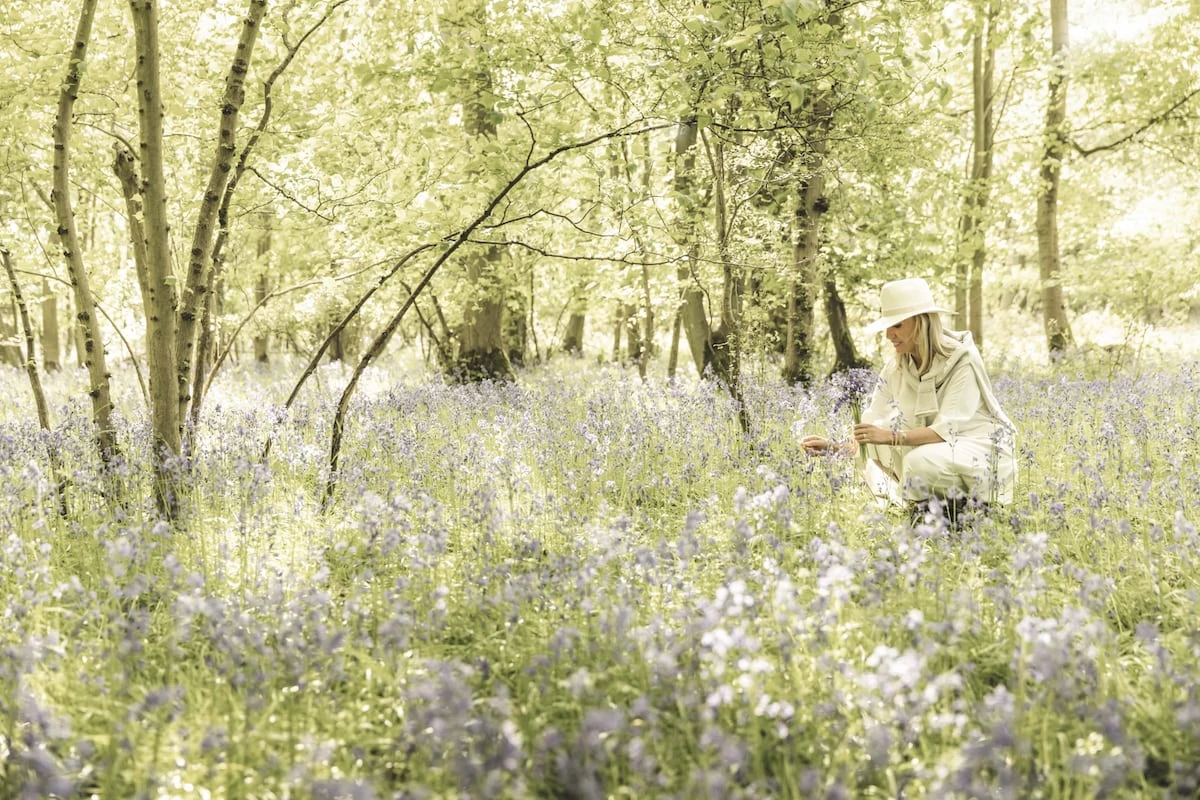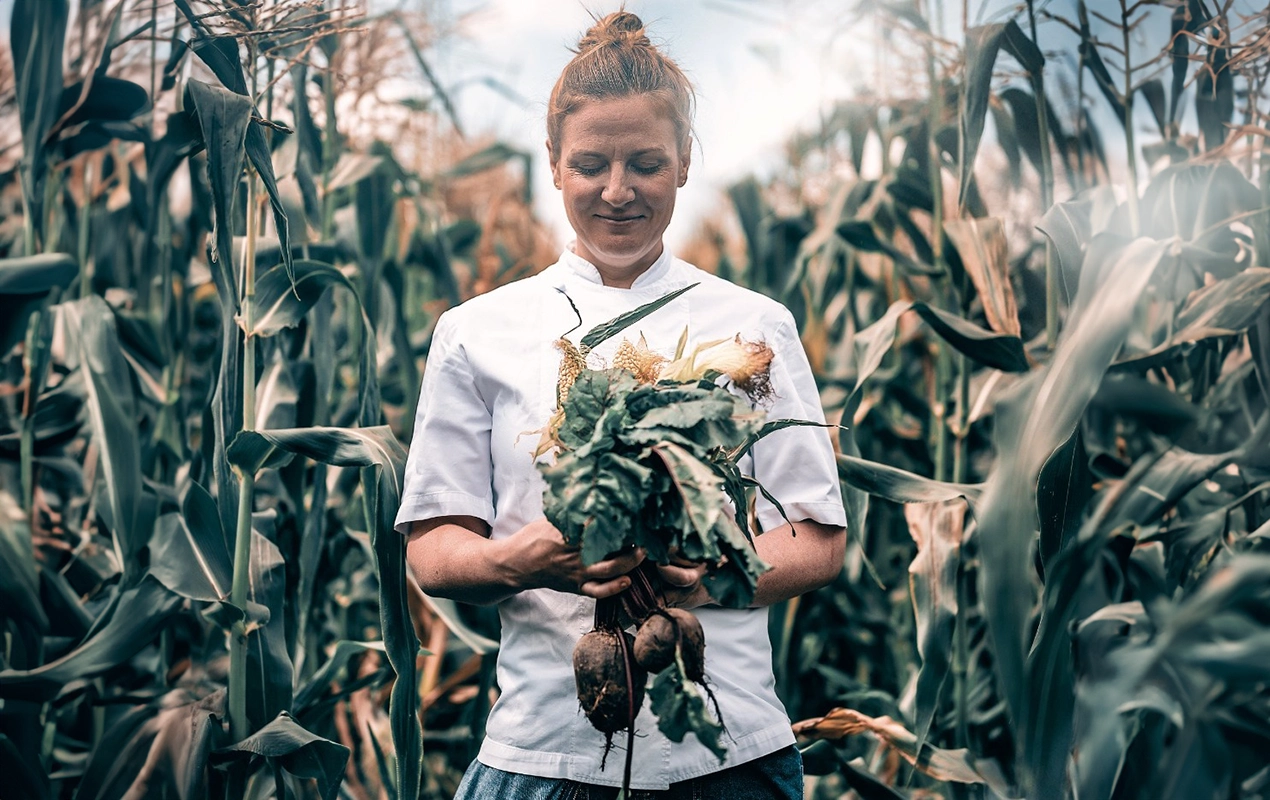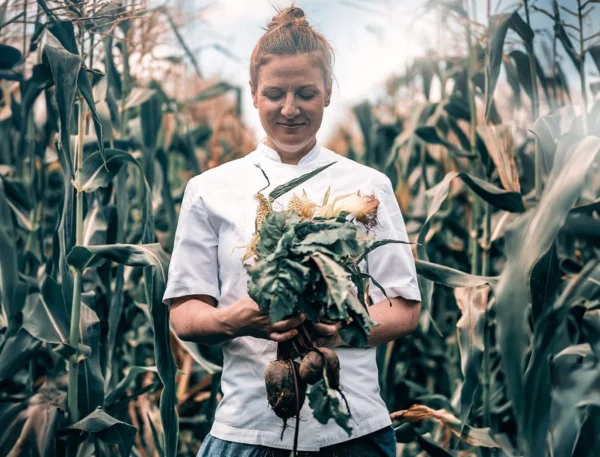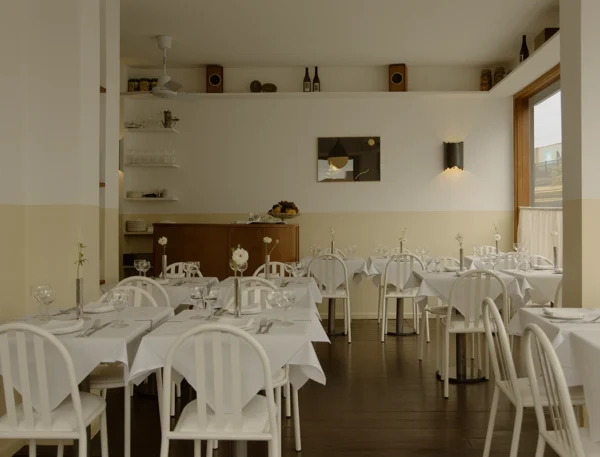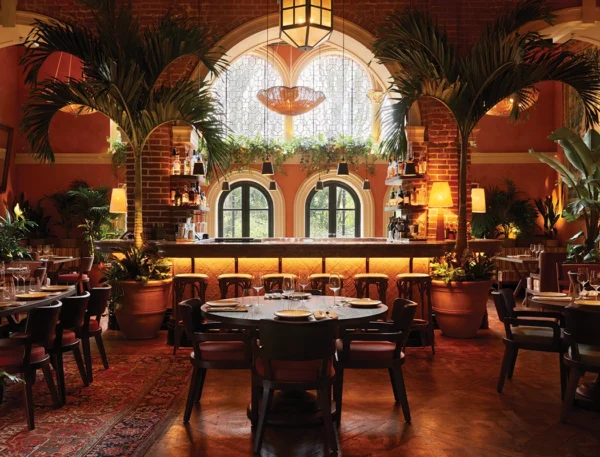From local organic produce to eco-friendly packaging, Lady Bamford, founder of Daylesford Organic, manages to combine business profit with her deep-seated ethical beliefs. In this 2018 profile, she shared with The Glossary the secrets to her success.
Lady Bamford looks nervous as she stands up to speak. The 72-year old founder of Daylesford Organic is hosting a party at her 2,500-acre Cotswold Estate to celebrate the launch of her debut cookbook, Nurture. “Massaged” kale and fat asparagus spears are brought to a dining table dressed with lily of the valley, white ranunculus and overhead wreaths – but it’s about more than just seasonal dishes and extravagant floristry. Nurture tells the story of Daylesford Farm, one of the early adopters of the organic movement in the UK.
It all started 40 years ago when Lady Bamford persuaded her husband (the billionaire chairman of JCB, Sir Anthony Bamford) to convert the family’s two farms (Wootton in Staffordshire and Daylesford in the Cotswolds) to organic. It signalled the start of an empire which she continues to build with military focus and precision.
A few cattle became a herd, a bakery grew into a farm shop, which expanded with three London outposts (Marylebone, Pimlico, Notting Hill), and the empire spilled over into Provence where organic wines and olive oils are made at the Bamford’s French home, Château Léoube. Now converted barns at Daylesford Farm showcase the entire lifestyle range. There’s a clothing line, an onsite spa, cafe and cookery school as well as nearby restaurant with rooms, The Wild Rabbit.
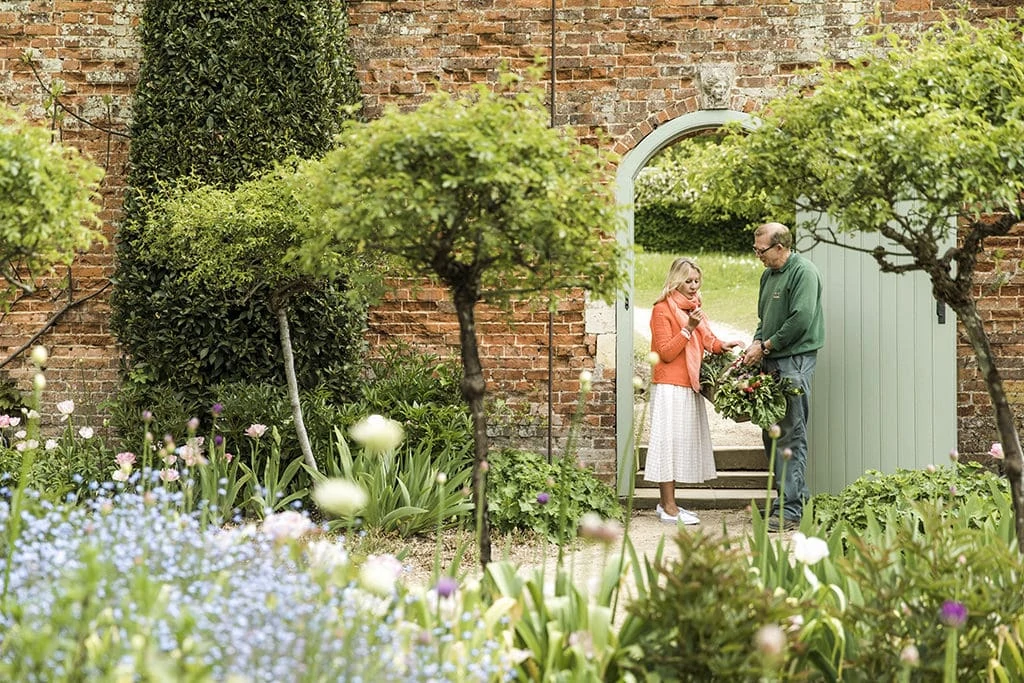 Pin
Pin Still, in spite of her commercial prowess, Lady Bamford appears anxious. A billowing elderflower coloured smock cloaks her iron will, and she peers coyly from beneath the rim of a straw fedora, carefully addressing her guests: “We can’t afford not to be organic,” she says in a small but firm voice. “We have to be organic if we want to look after this planet for our children and for our children’s children.”
The political rhetoric comes as no surprise – after all, Lady Bamford has advised environment secretary Michael Gove. But just as she’s getting into her stride, she suddenly catches herself: “Anyway that’s enough,” she says briskly. “I hope you enjoy what we’re eating today. It’s all from the farm, it’s all from the book. I’m quite nervous about it because it’s quite a big thing for me,” she says sharply, and sits back down.
It’s part of the dichotomy that is Lady Bamford. She is a natural campaigner, yet reluctant to speak in public. She’s furiously private, yet shares personal photographs with her 24,000-strong Instagram following. She’s been quoted as disliking five-star hotels, yet chartered two private jets to fly 180 friends to Jaipur for a joint 70th birthday celebration with her husband.
Despite evading the press, there’s an awareness that glimpses of Bamfordian luxury are key to the aspirational Daylesford brand. After all, “organic” once had a hessian and mung bean vibe, but since Lady Bamford opened her first store in 2002, she introduced a new aesthetic: pale-coloured Agas against Cotswold stone, woven willow and wild flowers.
Today, dramatic arrangements of foraged blackthorn blossom decorate the shop. There are wicker baskets heaving with purple sprouting broccoli, wild garlic and small bunches of pheasant eye narcissus priced at £10. In the dairy section, flavoured milk kefir and probiotic yoghurt are stacked alongside organic milk. Little wonder that it’s been said that calling Daylesford Organic a “farm shop” is a bit like referring to Karl Lagerfeld as “a dressmaker”.
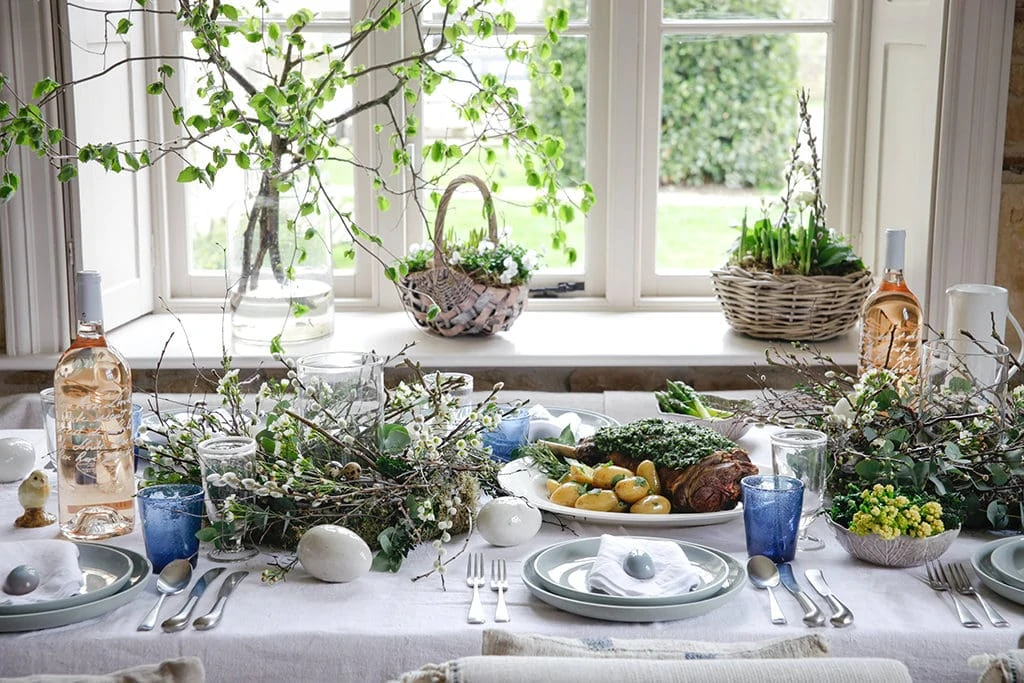 Pin
Pin There’s no doubt that only the very wealthy can treat Daylesford as their local grocers. The farm shops have however set an agenda and – as with haute couture – the ideas trickle down to the high street. No plastic bags have ever been used at Daylesford and it has only ever allowed re-usable coffee cups. Even the milk is packed in eco-friendly Caylmer pouches. “It’s something I am particularly proud of,” says Lady Bamford. “The packaging’s carbon footprint is significantly lower when compared to a standard HDPE plastic bottle.”
It might seem easy to build momentum now that organic has entered the mainstream consciousness, but it wasn’t always the way. The Daylesford story starts during the summer heat wave of 1976. Lady Bamford was in the garden with her firstborn, Alice, when she noticed that her newly planted roses were wilting. The farmer next door was spraying his crops with herbicide: “I could smell it, it was everywhere,” she remembers.
It wasn’t long after that Lady Bamford got chatting to an organic farmer at the Royal Agricultural Show in Coventry: “He explained to me what being organic meant and how we could raise our animals and grow our crops in a sustainable and natural way without pesticides or antibiotics,” she says. It appealed to something within – perhaps the simple ration card cooking of her childhood in Nottingham, which was dictated by the seasons out of necessity. “On the way home I recall saying to my husband, ‘We can’t carry on farming the way we are; we have to do it differently.’”
At first, Lady Bamford met resistance from the farm manager – but soon staff started to come round to the idea: “I remember our wonderful shepherd Dick coming to me and saying, ‘Do you know, you were so right – the animals are happier; they’re healthier because we’re treating them homeopathically, and the lamb has a better flavour.” Now staff flock to the farm – keen to be associated with such a pioneering brand. Tim Field, an environmental scientist who has worked at Daylesford for 11 years, beams with pride as we set off on a tour. He points out Daylesford Wetlands and the Gloucester cows – a rare breed that the Bamfords have been instrumental in preserving. There are beehives, Ledgber hens in the heritage orchard and Ryeland sheep who have hit the jackpot – the Fairmont of farmyards.
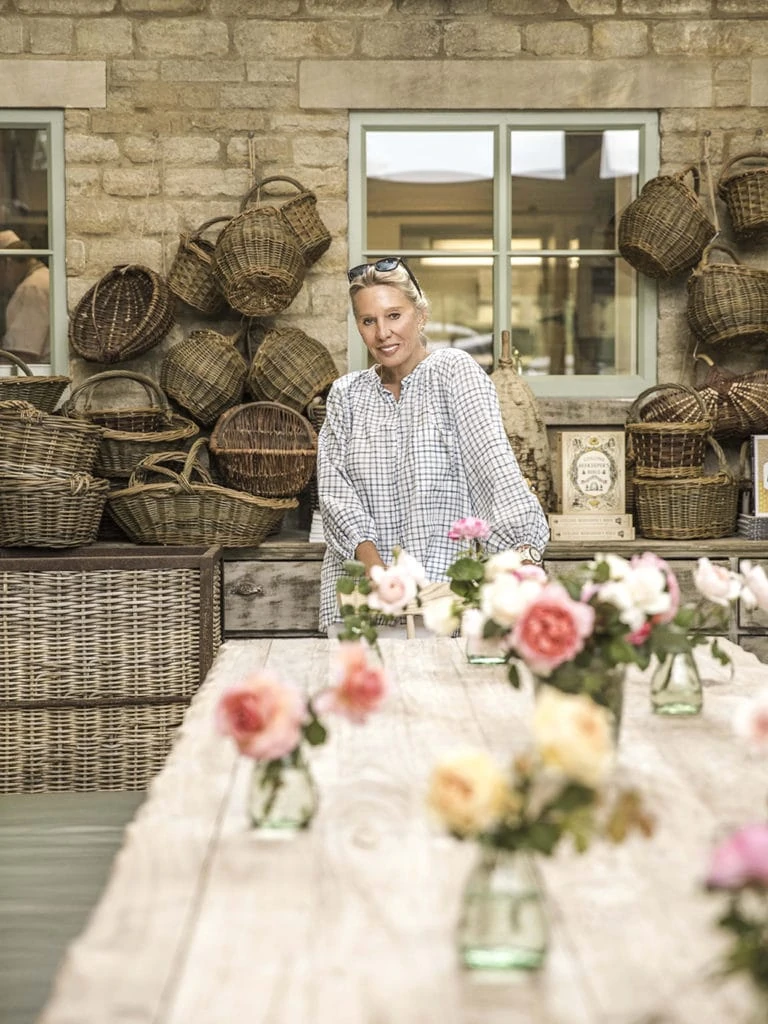 Pin
Pin We pull-up at a half-acre strip of woodland. There’s wild garlic and a flowering cherry, crab apple, hawthorn, blackthorn, field maple and goat willow. “It provides a year-round source of nectar,” explains Field. “Not only good news for honey bees, but skylarks too,” he says, pointing at the soaring birds overhead. Their numbers have plummeted because of over-efficient agricultural practices, but they are clearly thriving in this idyllic patch in the Cotswolds.
In the market garden, manager Jez Taylor takes over, as he shows us some of the 300 varieties of vegetables that are grown for the shops, cookery school and cafes. There’s sorrel and lovage, vegetable oyster and sea kale. In the neighbouring field, a patch has been recently designated as the “cutting flowers” garden: “Last year, Lady Bamford came out here with me and said, ‘Jez, I want it to be all flowers out here. I’m fed up of buying things off a Dutch lorry, it’s a thorn in the side of Daylesford – there’s nothing organic about it, so let’s take control.’”
Already, Daylesford has harvested 12,000 daffodils, now it is onto the different varieties of tulips, dahlias and roses. The cutting garden isn’t the only innovation though – throughout the day we hear about plans for the heritage apples to be used for single-origin ciders, the retired dairy cows to be used for beef and sustainably sourced woodchips to be used in the recently installed biomass as the farm strives toward a “zero waste” status.
Then there’s the 298-page cookbook to promote. While others might start winding-down in their 70s, Lady Bamford is still ramping things up motivated by a heartfelt belief in the Daylesford philosophy rather than money, fame or prestige: “We’re custodians of our land, our soil, or bodies and minds, and our precious planet,” she says. “I think we can all make small changes to live in a more mindful way and strive to leave our world in a better state than we find it.”
“Nurture: Notes and Recipes from Daylesford Farm” by Carole Bamford (£35, Square Peg) is available here.





